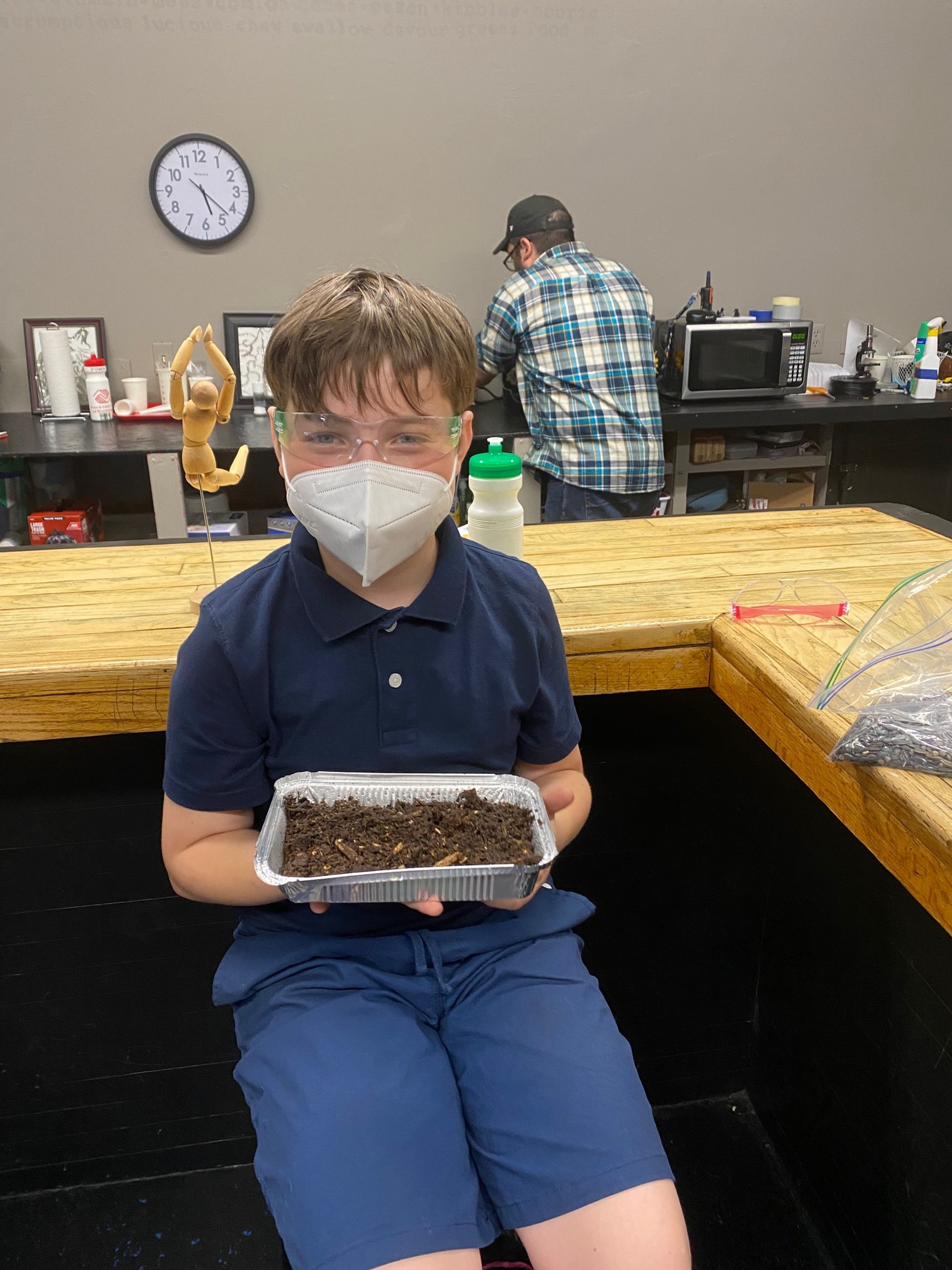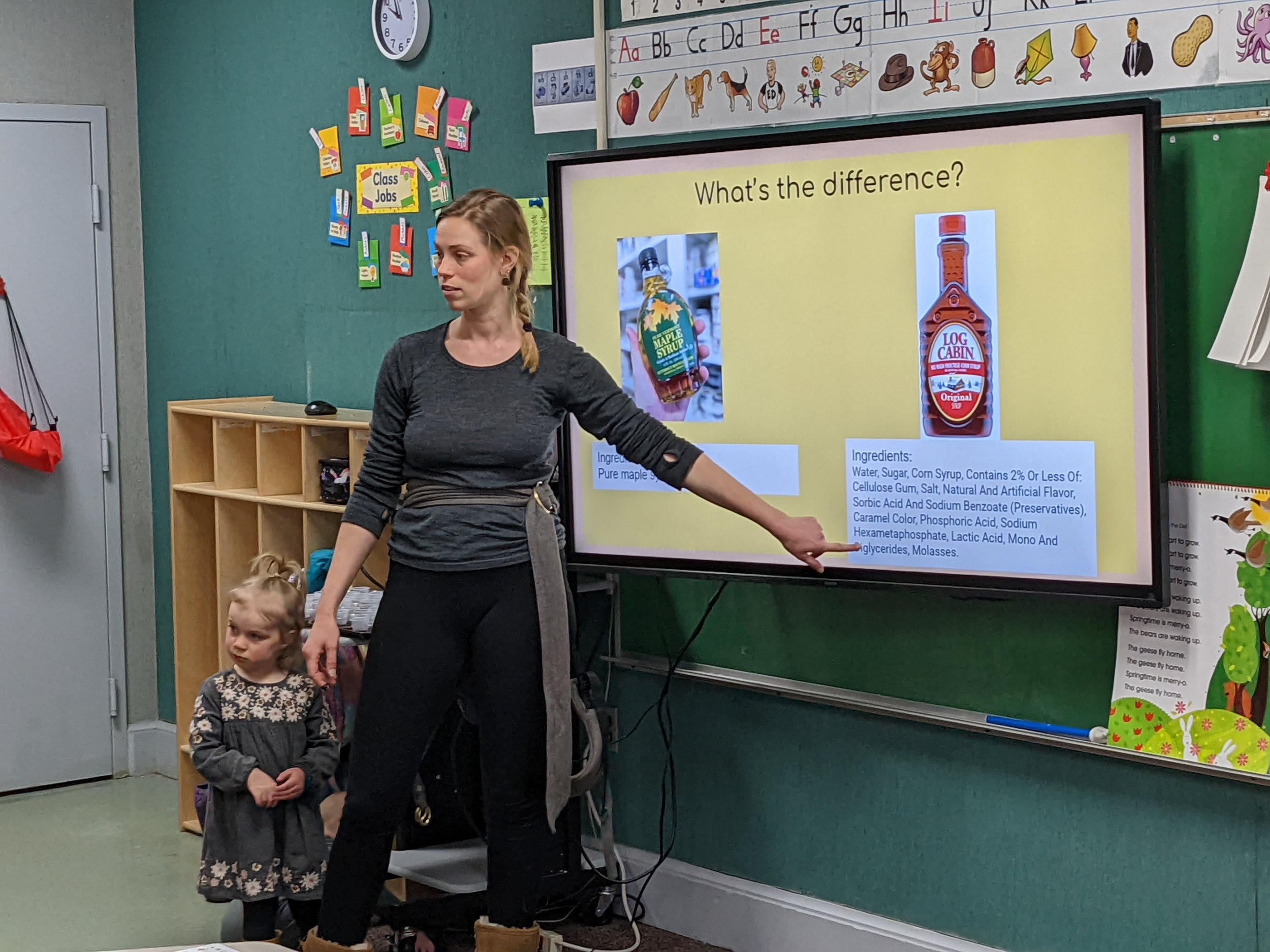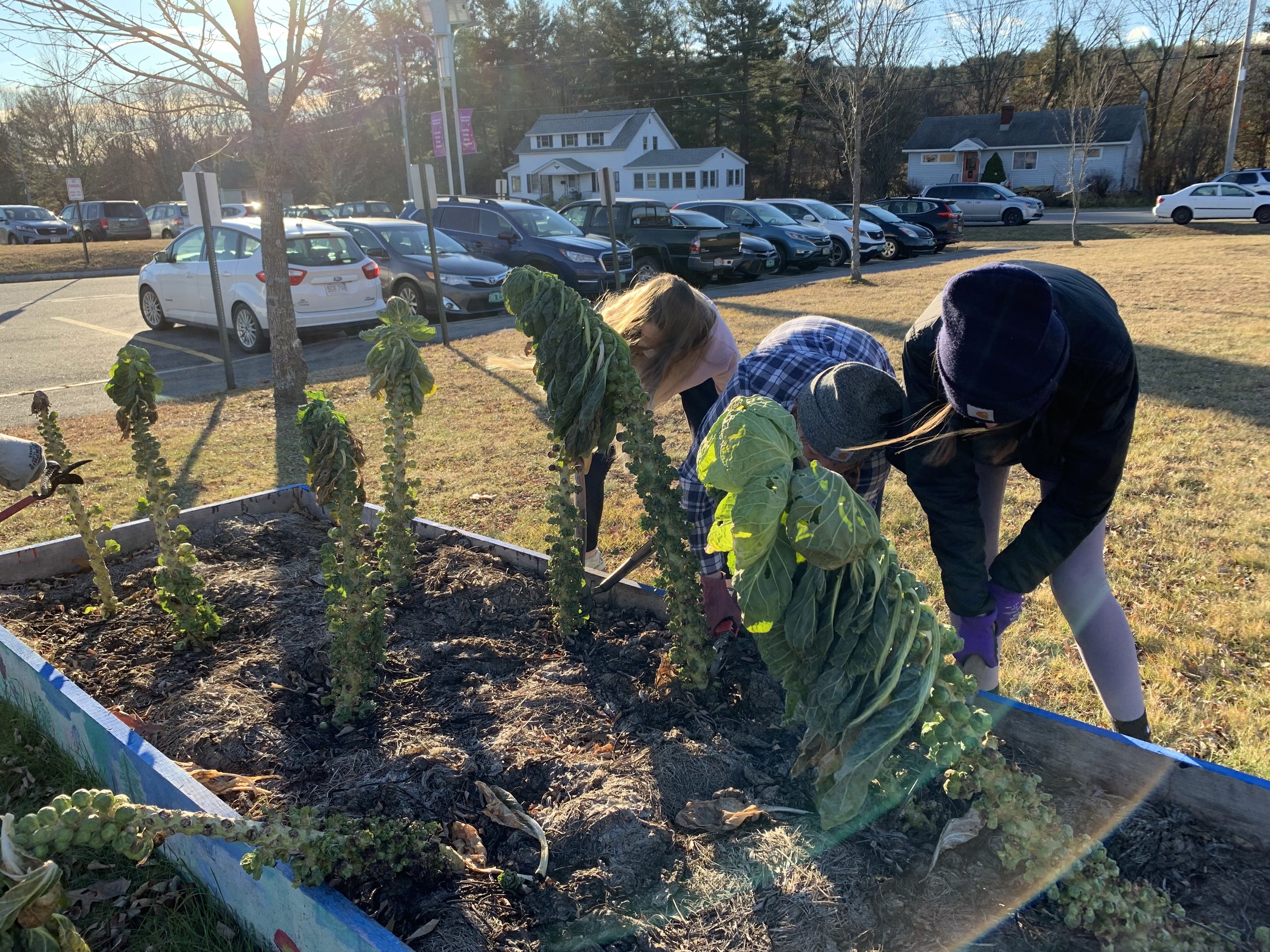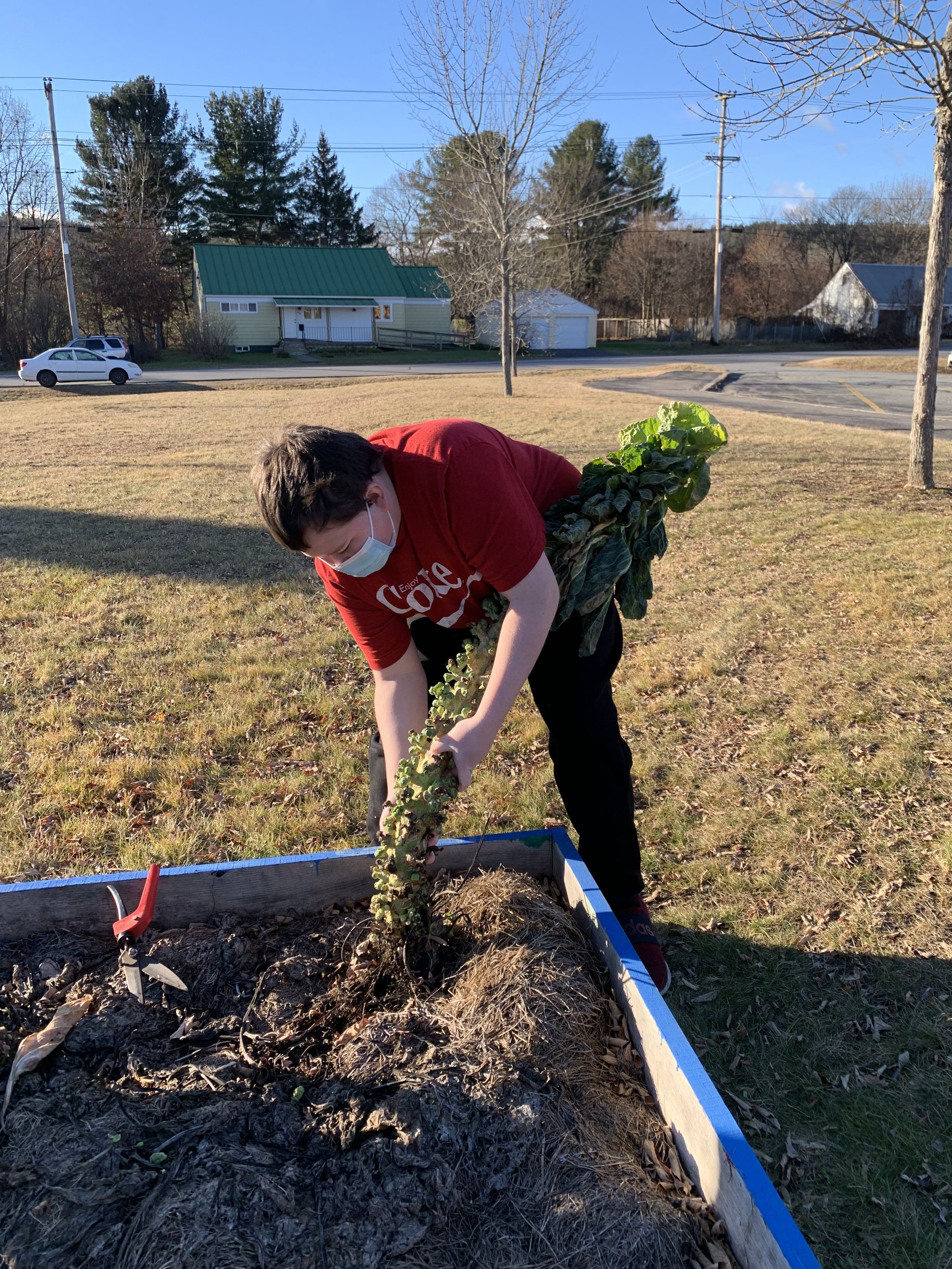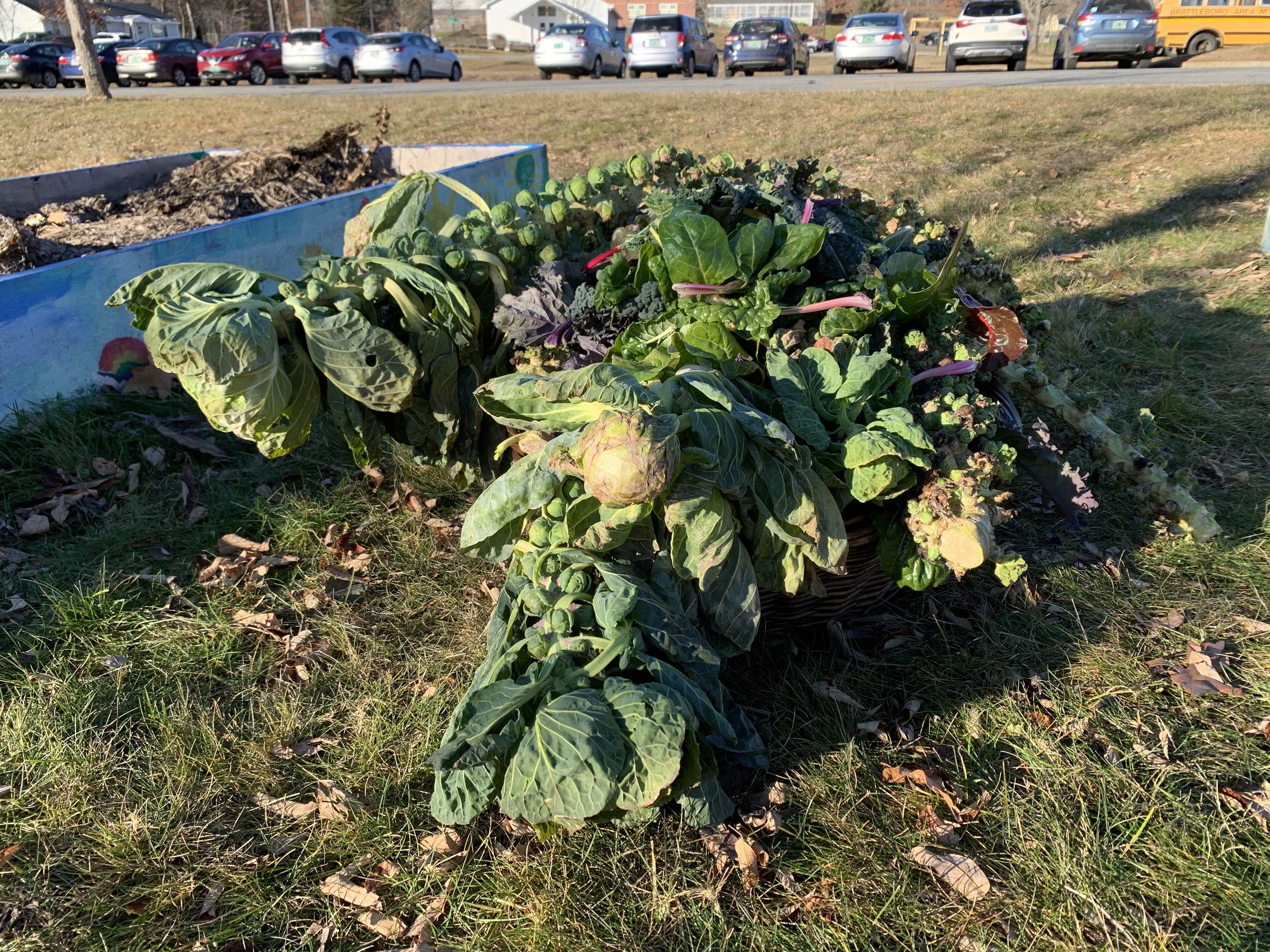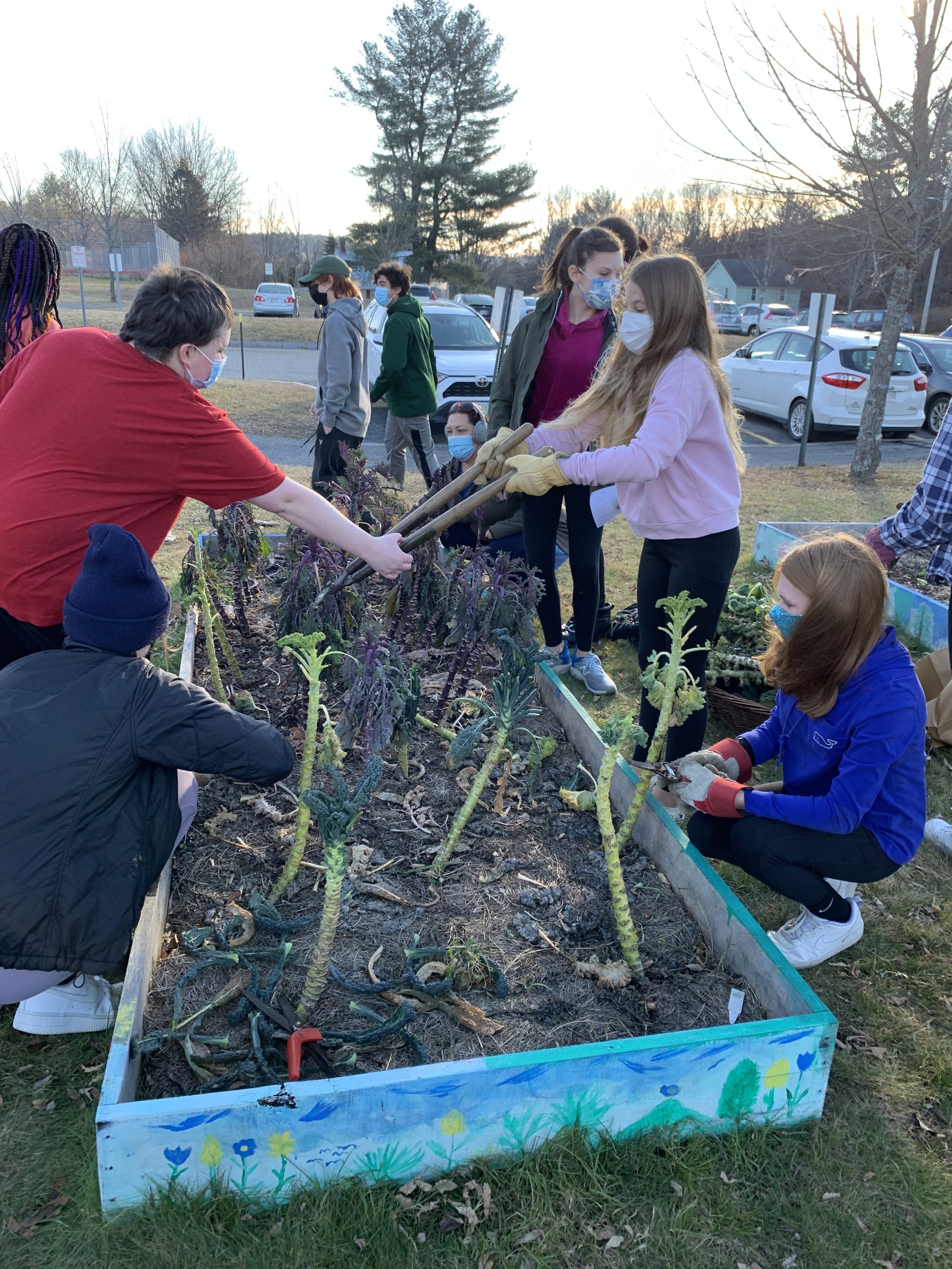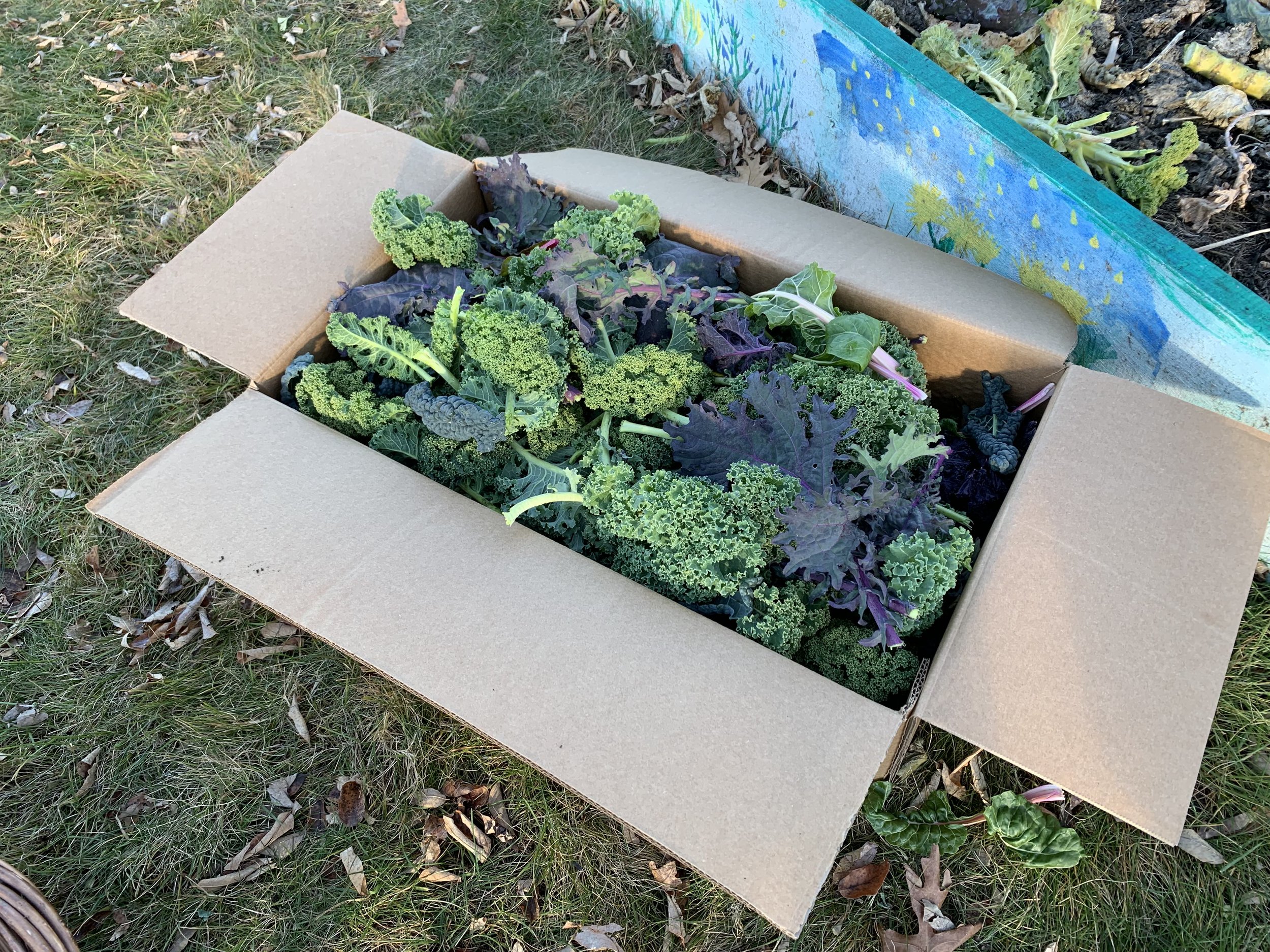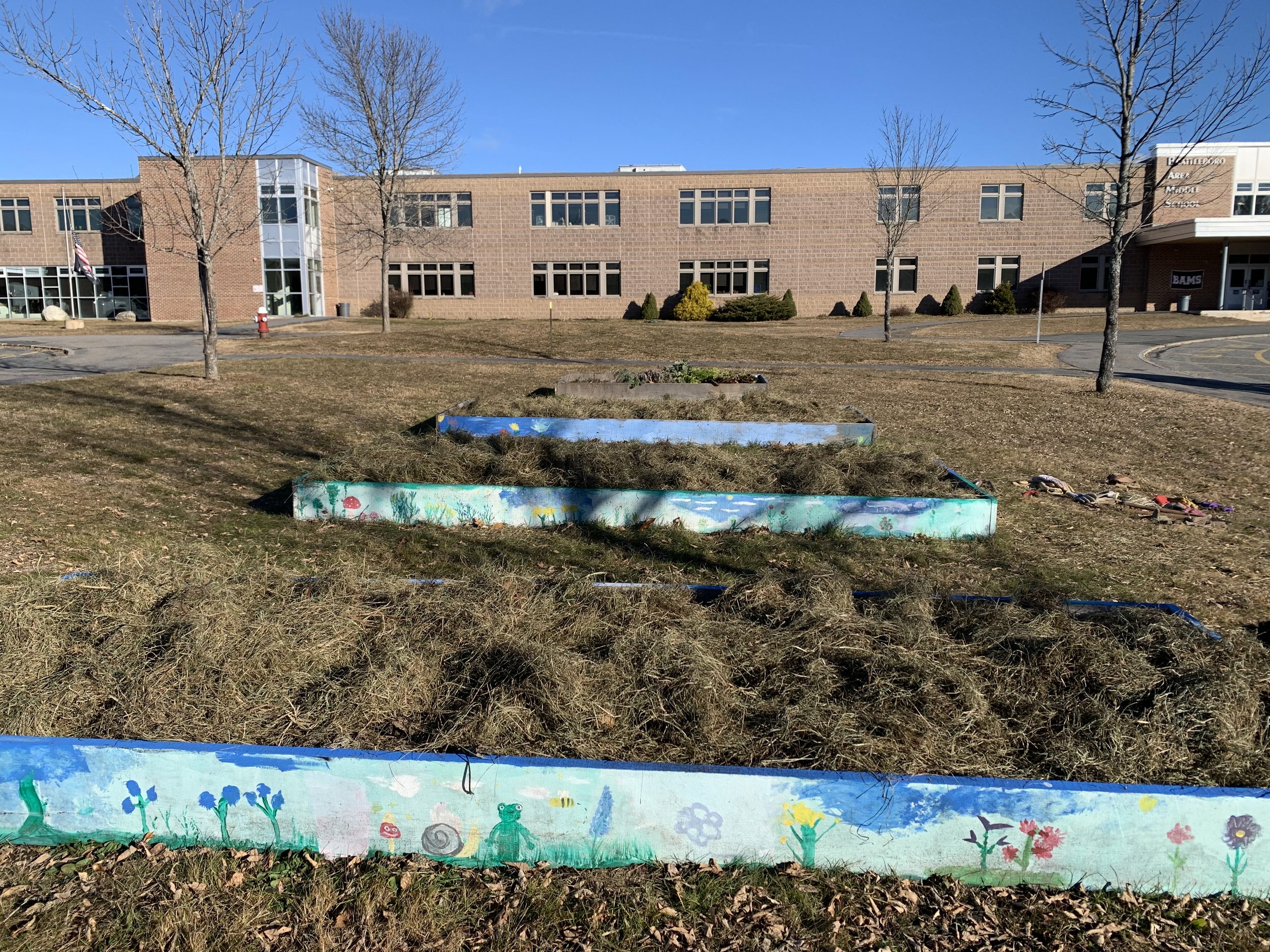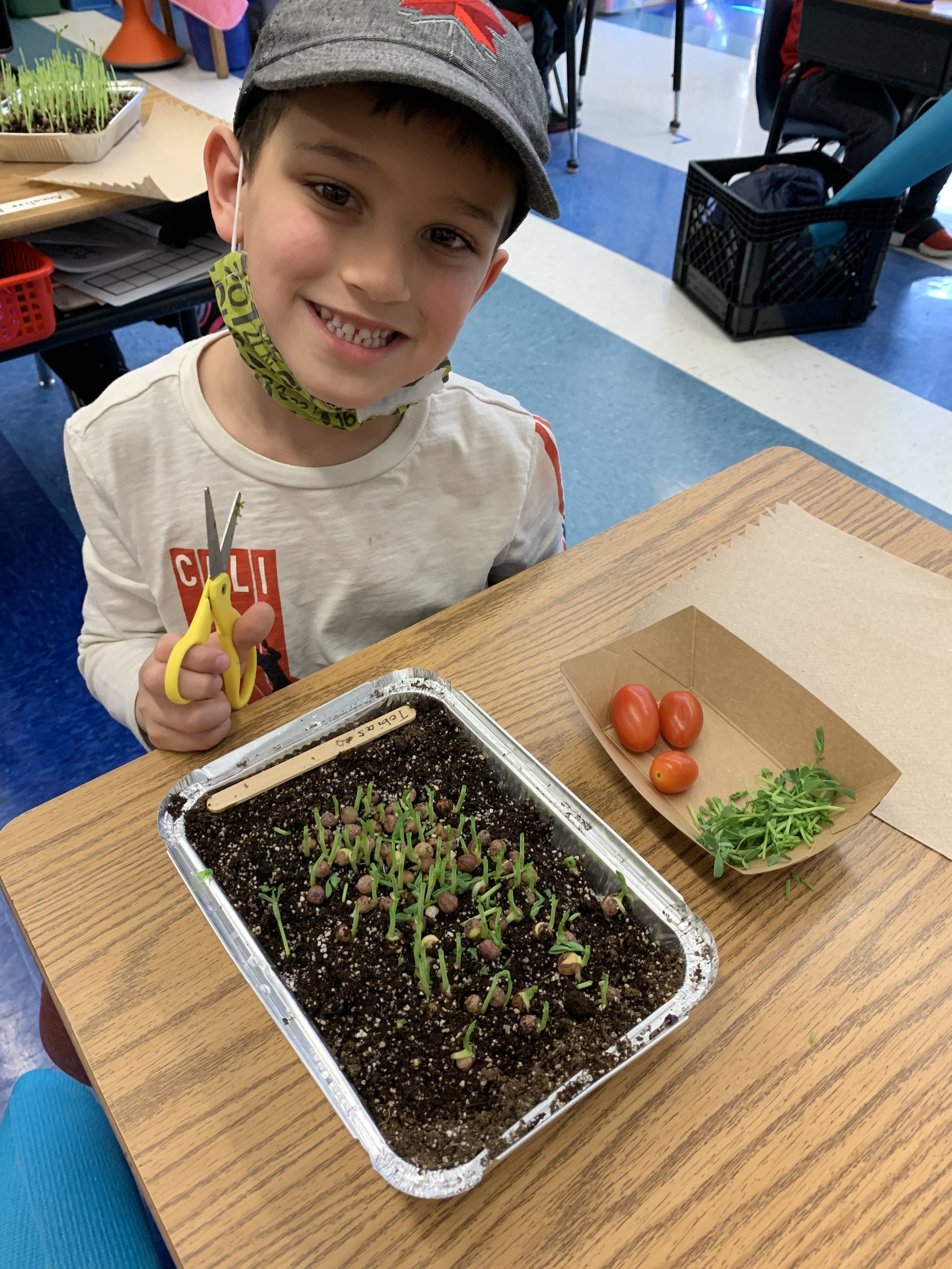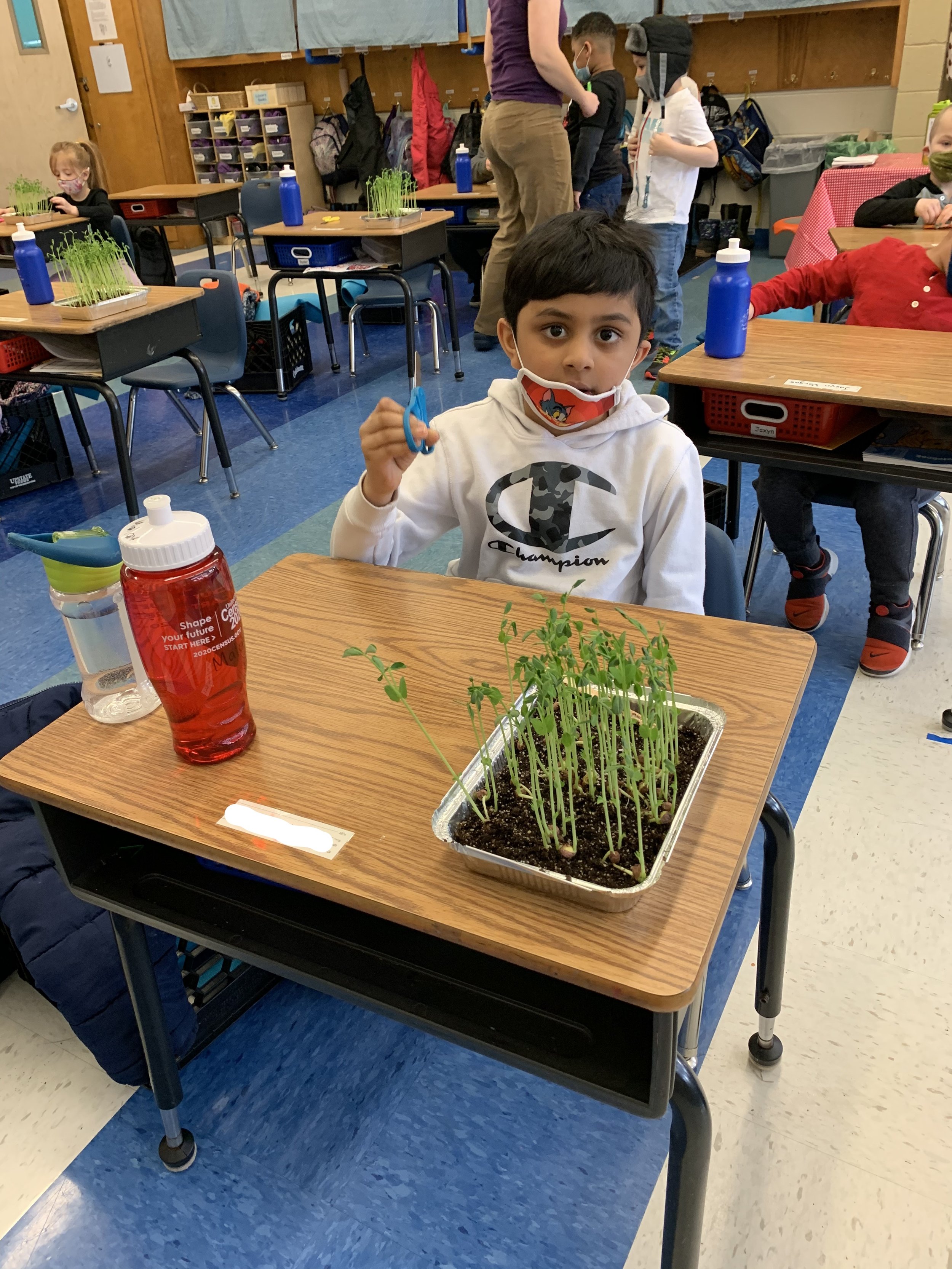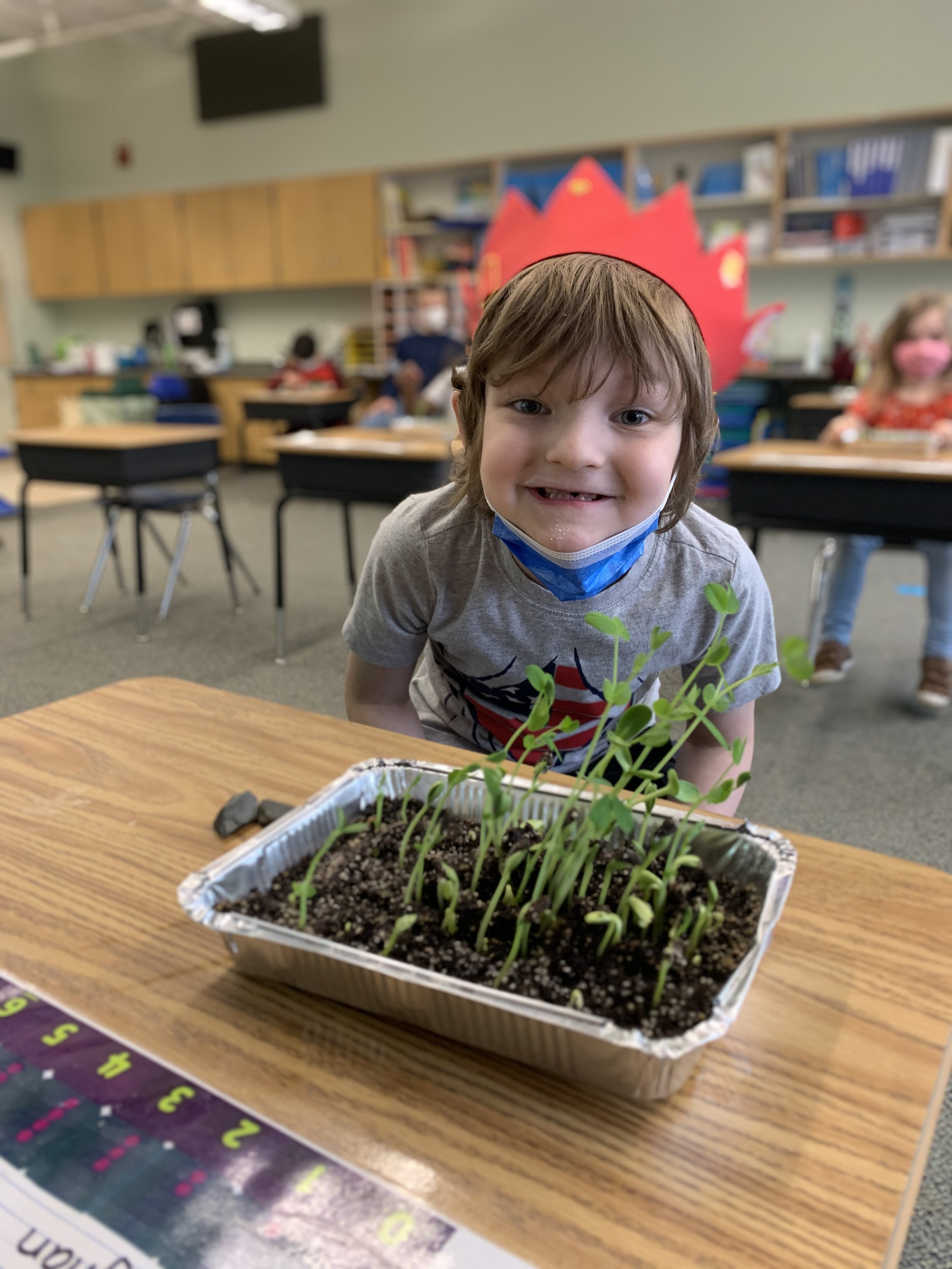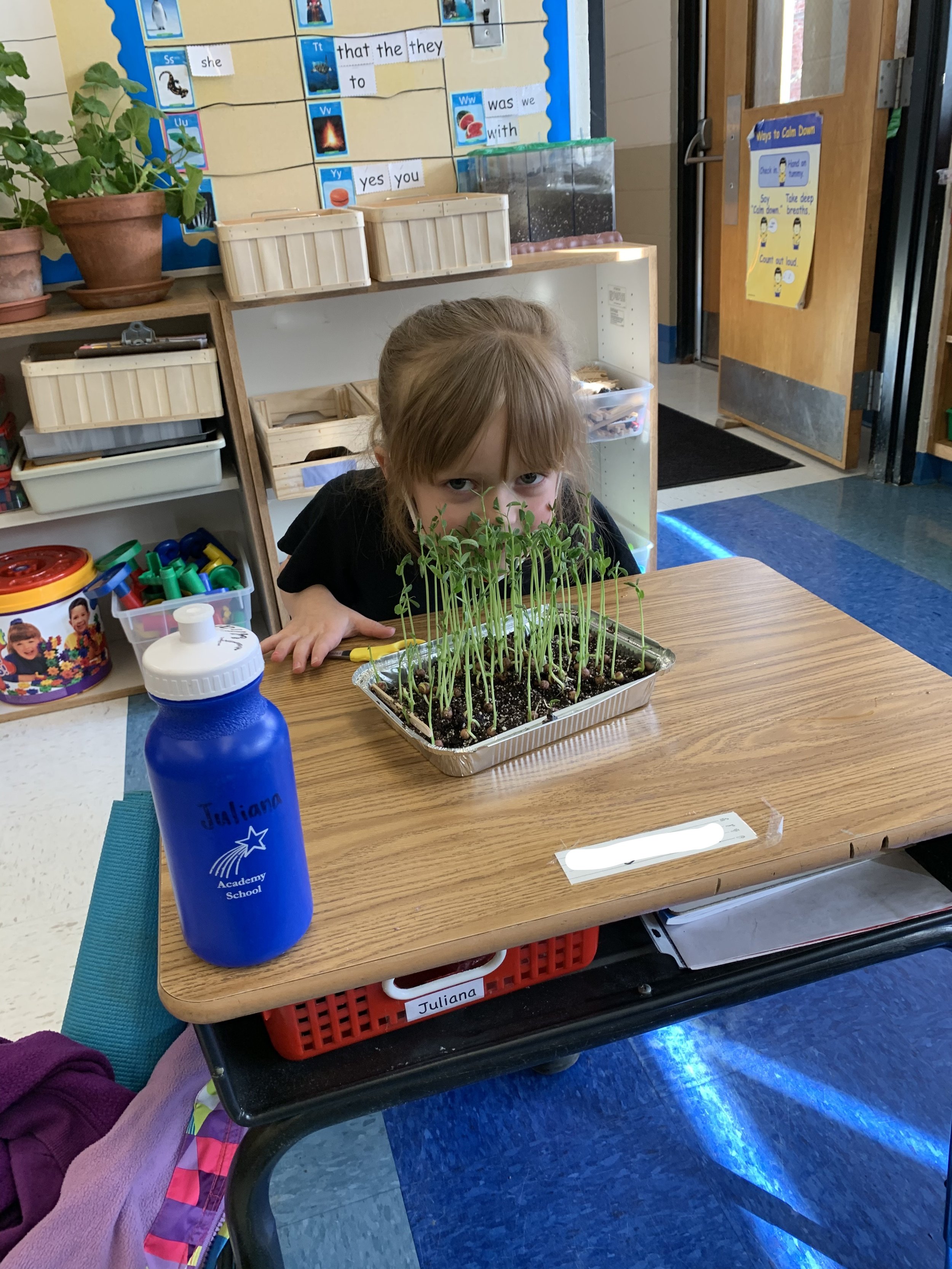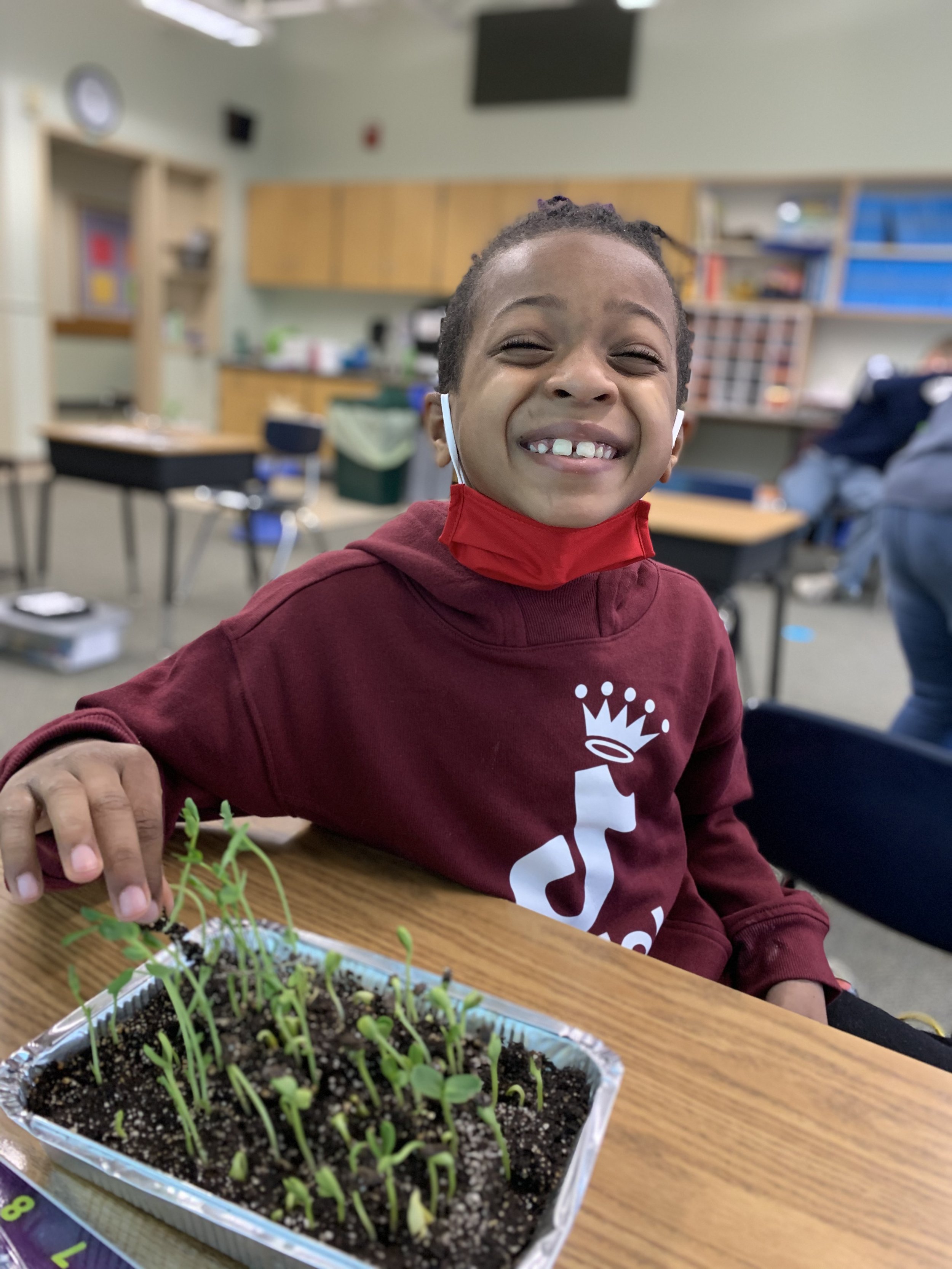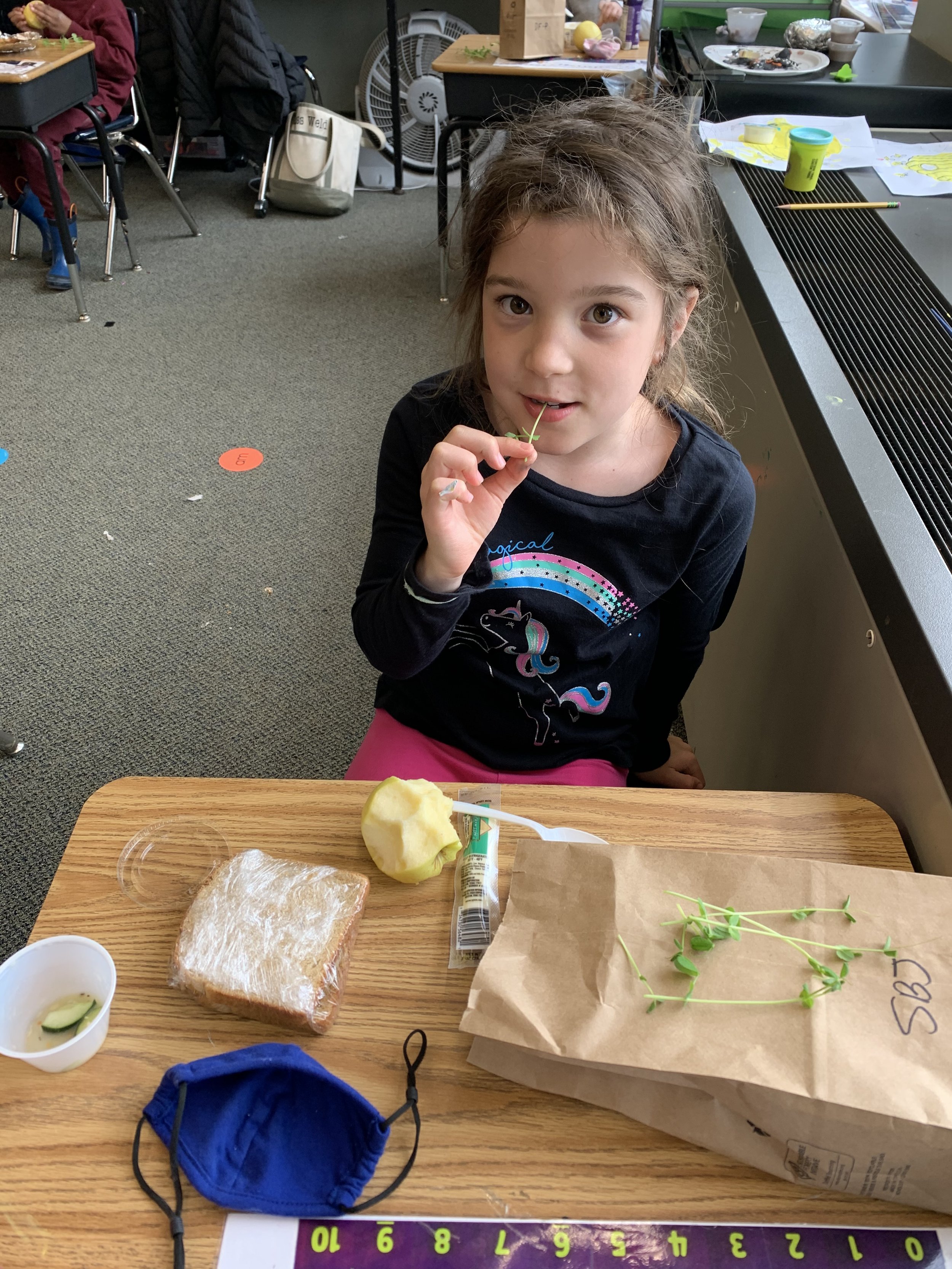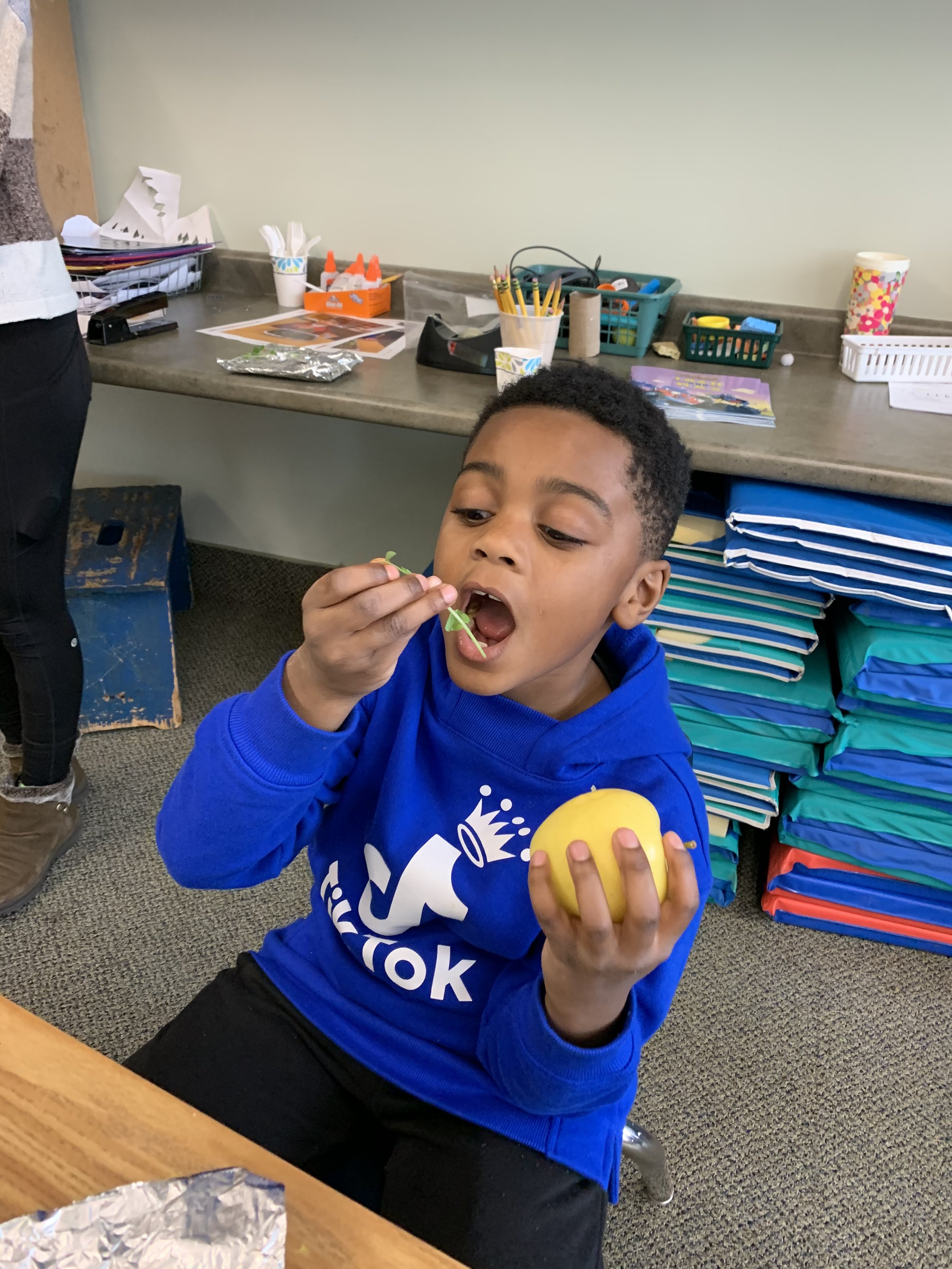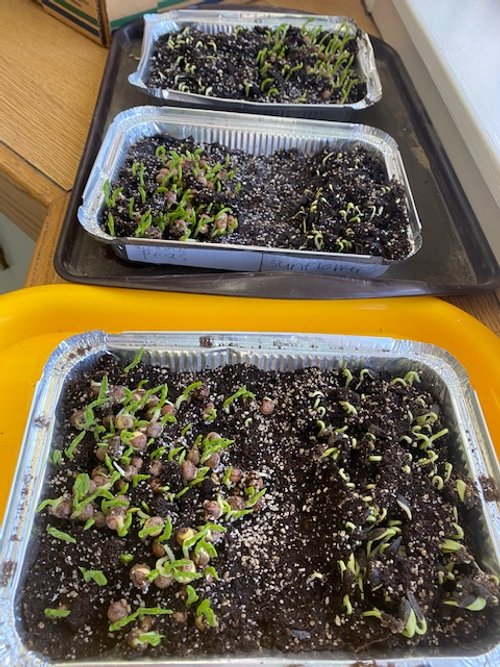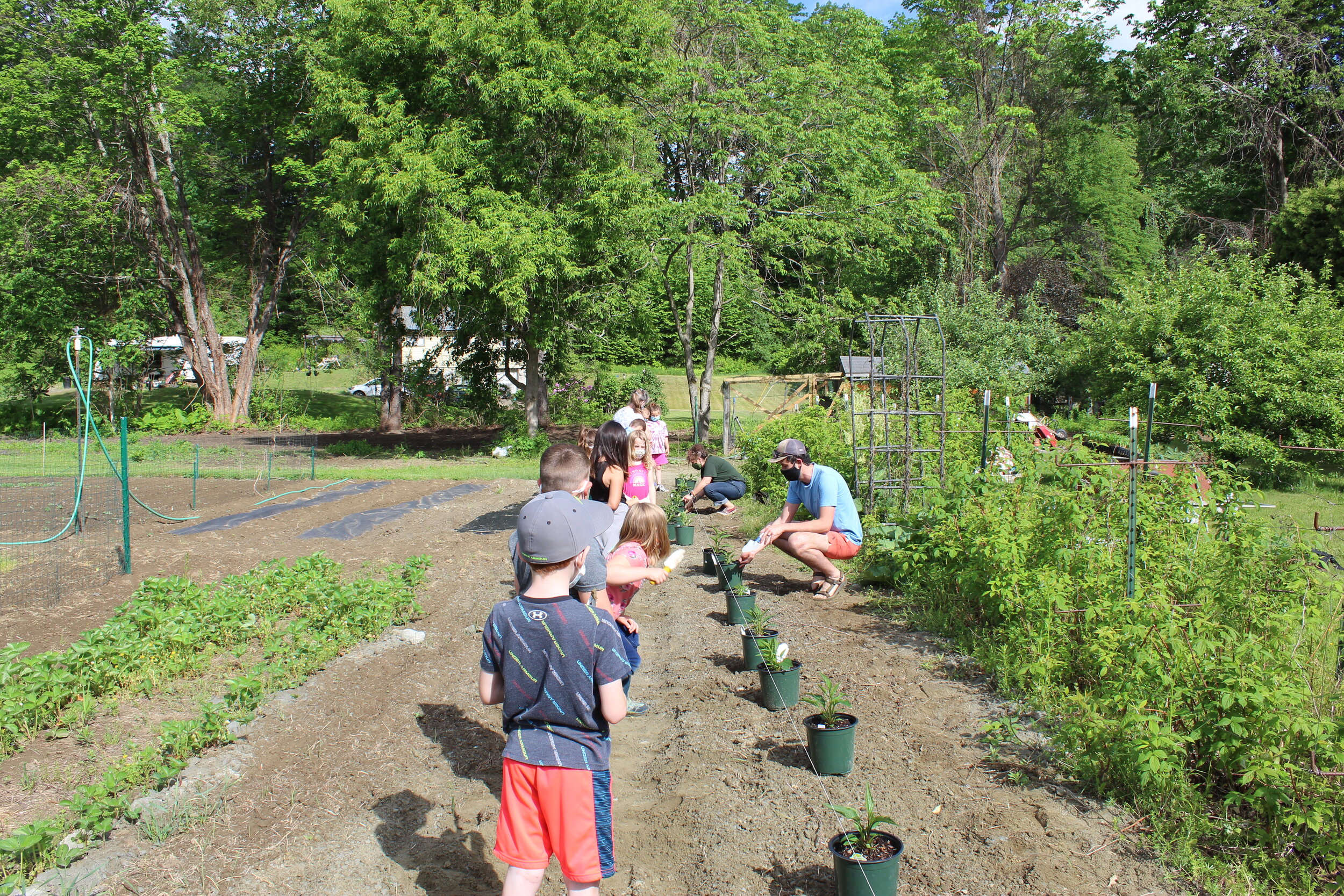Second graders from Academy School got to share their scratch cooking skills by making beautiful chocolate beet cupcakes, topped with pink frosting tinted with beet juice, for a recent Windham Southeast School District (WSESD) school board meeting. This delicious treat was just the beginning of a very special Valentine’s Day evening presentation celebrating school gardens, Farm to School programs, and outdoor education in WSESD schools.
An Inspiring Year at Central Elementary School
Central Elementary School (CES) recently closed out a phenomenal year of Farm to School (FTS) programming, wrapping up 12 months of work dedicated to advancing food education at the Bellows Falls area school.
Selected as a participant school for the 2021-2022 Shelburne Farms Northeast Farm to School Institute, CES won a $5000 grant to jumpstart their FTS programming. While the school already had a garden and dedicated food service staff, the funding and coaching provided by the Institute helped to formalize the FTS program and integrate it more fully into the school culture and environment.
A thriving Farm to School program usually involves three key components: the classroom, the cafeteria, and the community. Often, it takes years for a school to be active in these areas, but Central’s team has grown its program from the beginning and has a comprehensive program that reaches into each of these areas.
In the classroom, Farm to School came alive in the 2nd-grade classrooms. Teachers Kate Kane and Judy Verespy worked closely with librarian Jody Hauser to devise monthly programming that included everything from art projects and read-alouds to food preparation and tastings.
In October, students harvested carrots from the garden, painted carrots with watercolors, and made informational posters about carrots before teaching other classrooms what they’d learned. Food Service Director/Garden Coordinator Erica Frank baked delicious carrot muffins for the entire school. In January, students painted with beet juice and made beet hummus in the classroom. Erica, again tying in the cafeteria, made nutritious and delicious beet brownies for the school food program.
The third “C” of successful FTS programs is community, and Central Elementary was able to connect with its community in impressive and innovative ways. In March, when the Harvest of the Month was maple syrup, the students visited a neighborhood home that ran a sugaring operation! They also tasted some “sugar on snow” made by a local (teacher’s!) family. In the spring, local farmers John and Teresa Janiszyn of Pete’s Farm Stand in Walpole, NH, visited the classroom. The farmers taught students about soil and composting, and students planted cucumber seeds. Weeks later, they transplanted these same cucumbers into the fields at Pete’s! What an amazing circular connection between students and the farmers in their communities. It has been a mutually beneficial relationship between the community and Central Elementary this school year, with each gaining and giving benefits to the other. The Rotary Club of Bellows Falls came to help with a Garden Volunteer Day and donated garden supplies. Students received gift cards to buy something at Pete’s, funded by the FTS budget.
Central’s story is one of success, but it’s only the beginning of their journey, and it has been possible through many dedicated staff members and community support. The Institute helped the team shape an action plan for their program. Principal Kerry Kenedy has supported FTS from the beginning and plans to integrate the program more deeply into the school culture over the years. One step in this process is that next year, the third grade will join the second grade in receiving monthly programming. Physical Education teacher Peter Lawry was integral in planning, building, and maintaining the garden. And Erica Frank has worked to connect the summer school program to the FTS activities throughout the summer.
If you’re curious about all the amazing things Central has been up to, please check out the inspiring book Librarian Jody Hauser made with the students.
Food Explorers
This spring, Food Connects and Edible Brattleboro partnered up to run a Food Explorers program at The Boys & Girls Club of Brattleboro. The group was small but mighty, and Food Connects staff had a lot of fun getting to know the club kids and building stronger relationships with the amazing folks at Edible Brattleboro.
Let’s start with some background on The Boys & Girls Club Flat Street location. Inside the inconspicuous doors is a huge, welcoming space. There are hanging plants, plenty of foosball and air hockey tables, a place to play basketball, a stage, and even an indoor skate park. Upstairs is a tech room and space to play creative games like Magic the Gathering and Dungeons and Dragons. Trust us when we tell you, this place has something special for every child! This location is open to middle and high schoolers from 3:00 PM to 7:00 PM, Monday through Friday during the school year, with differing summer hours, and serves as a safe place for kids to learn, grow and have fun.
In late winter, Food Connects staff gathered with Boys & Girls Club staff to brainstorm ways the two organizations could work together. Excitement filled the air as the idea for the Food Explorers program began to take shape. Soon, Edible Brattleboro, a local organization that works to address food insecurity by building and caring for help-yourself gardens, also joined in, and Food Explorers was born.
Thanks to Edible Brattleboro's generous donation, we built a grow cart together, started seeds using said grow cart, and planted them in the help-yourself garden at Turning Point Recovery Center. Our Farm to School Manager, Sadie Hunter, joined the kids seven times between May and June to engage them in food and gardening activities. Participating in a growing cycle this way was very rewarding, and we hope these plants will be enjoyed by many all summer long.
Some of the other activities that we did together the past few months include an activity around light and seeds, a science experiment examining starches, and seed starting in many different ways.
We hope that we can all continue working together to bring local, yummy food (and engaging Farm to School learning) to our community!
Blue Cross and Blue Shield Mini-Grants Support FTS Programming in Area Schools
Several area schools, including Academy School, Towsend Elementary, and Newbrook Elementary, were awarded grants by the Windham County Community Advisory Board of Blue Cross and Blue Shield of Vermont. This is a volunteer board of dedicated Windham County residents who are local champions of healthy activity and programming of all kinds. Several proposals were submitted for this round of funding to strengthen Farm to School (FTS) programming, and Food Connects is thrilled to celebrate this vital support for FTS-related wellness projects in some of our member schools!
At Academy School, 4th-6th grade classes are excited to receive funding to purchase a grow lab and humidity tent that they will use to grow plants for their garden beds. The grow lab will provide approximately 180 students the opportunity to become more involved in starting seeds in their classrooms. The seedlings grown will stock their school garden beds with vegetables, herbs, and flowers that can be used for cooking activities in their classrooms.
Townshend Elementary School launched a brand new FTS program in March. This grant will provide vital funding for purchasing ingredients and materials for Harvest of the Month taste tests and seed money for starting a small garden at the school. Taste tests are being given in each school classroom, reaching all 110 students. Students enjoyed the first Harvest of the Month activity in March, which focused on maple syrup. Teachers have already utilized funds from the grant to purchase a variety of whole grains for students to see, touch, and make art with, as well as some whole-grain bread and plain, refined flour white bread for April’s taste test. Garden planning is underway!
Just down the road at Newbrook Elementary School, the grant will fund multiple FTS-related projects. A woodfired pizza oven is central to Newbrook’s school culture and FTS program. This grant will fund the purchase of firewood to fuel the oven for six months and ingredients for pizza dough and sauce. The FTS team is also building two new raised beds next to the pizza oven so that students will be able to enjoy or work in the garden during recess time, if they choose, and will be able to harvest herbs and pizza toppings moments before their pie goes in the oven! The remainder of the grant will be used to restock the school’s cooking cart so that Amy Duffy, the school’s Garden Coordinator and FTS Educator, can continue to cook with students during her weekly visits to each classroom.
Many thanks to the Windham County Community Advisory Board of Blue Cross and Blue Shield of Vermont for supplying these grants and providing essential funding for activities and green spaces at our local schools.
First Garden Harvest at BAMS!
On a chilly morning in early December, Food Connects staff joined a group of approximately 15 students and Brattleboro Area Middle School (BAMS) teacher Mandy Nash for the final garden harvest and to put the school garden to rest for the winter. These new garden beds, built in the spring of 2021, finished the season strong! They were a source of fresh herbs for the school cafeteria throughout the summer and fall. This final harvest included Brussels sprouts, kale, and swiss chard. Food Service Director and chef Ali West of Fresh Picks Cafe was eager to transform the produce into a harvest salad for BAMS students to enjoy in the school cafeteria at lunchtime.
Students rose to the challenge of using big loppers to chop through the thick stems of the brussels sprouts, and several students were very curious to see the tiny aphids who had infested several kale leaves. At the end of the harvest, the last step was covering the beds in local mulch hay donated by a BAMS family from Guilford.
Getting outside and doing hands-on garden work can be a rarity during the busy academic school day, and Food Connects was happy to provide the tools, resources, and support to help make this first harvest a success. BAMS is already thinking about spring planting in a few short months, and Ali West has requested more fresh herbs for her kitchen!
Sprouting Success with Farm to School
Our popular classroom sprouting kits are back!
In the winter of 2021, we were looking to engage classrooms in Farm to School programming. We dusted off the archives of some old projects and decided to try out sprouting kits. And oh boy, was it a hit.
Sprouting kits seem pretty simple: each student gets an aluminum tray, some soil, growing instructions, and sunflower or bean shoot seeds. But multiply that number by 800—the amount we delivered to schools across Windham County in 2021—and it goes from a simple project to one that has a significant impact on our community. Imagine 800 students across the county taking care of their seeds, watching them grow, and taste testing them in a few short weeks!
And the sprouting kits were a huge success last year. Teachers could have a pre-packaged lesson planned that was easy to implement in their classrooms. Farm to School and gardening activities might be challenging for some teachers to implement in the cold winter months. This indoor activity enables all students access to farming and nutrition education, even when the school garden might be dormant. This hands-on opportunity to learn about planting seeds prepped the students for their spring school garden work and got many students excited about growing their food.
Because of the huge response to this program last year, Food Connects relied heavily on donations from our corporate sponsors like the Brattleboro Automall. The Brattleboro Automall feels a special responsibility to serve our local community and support local groups and events whenever possible. We are grateful for their continued support of our Farm to School program and ensuring we can continue to provide these excellent sprouting kits to the children in our local schools!
We are excited to announce that sprouting kits requests are now open for 2022.
We hope that bringing back our Sprouting Kits helps provide an opportunity for hands-on growing in your classroom. We will provide all of the materials, a lesson guide, and coaching from our FTS team to make sure you feel confident implementing this activity in your classroom. It could potentially tie into your science unit, be a primer for more growing projects this spring, or simply be a fun, hands-on activity for your students.
Food Connects will deliver classroom kits to your school that contains:
Aluminum trays for each student to grow their sprouts
Soil
Seeds (sunflower and pea)
Growing instructions
An optional lesson guide and book recommendations to pair with the activity
How Gardening Helps Your Mental Health
Guest Writer: Andrea Poteet-Bell, Sunshine Behavioral Health
We should all take our mental health seriously. But many people today struggle with a variety of mental health challenges including excessive stress, depression, and anxiety. Due to the impact that mental health can have on your life, finding ways to manage and improve it is paramount. One strategy is to participate in healthy activities, such as gardening, that allow you to focus your energy on something positive. Gardening is a great way for adults, children, and people of all ages to manage their mental health.
Focus on Tasks at Hand
One of the ways that gardening can help with your mental health is by allowing you to focus on the task at hand instead of dwelling on the past and worrying about the future. Finding a way to concentrate on something will take your mind off worries and other negative thoughts.
Good Exercise
If you want to improve your mental health, you should consider getting regular exercise. While it can feel difficult to get started, exercising is a great way to boost your mood and beat stress. Gardening is a great form of exercise because it requires a lot of moving, digging, and sometimes hauling bags of soil. This can help you burn calories and improve your mood. And because modifications like sitting on a pillow or using a wheelbarrow to move heavy objects are available, it’s a great option for people with limited mobility.
Socialization
Gardening is also a great way to spend time outdoors with your family and bond over a shared interest. When you truly enjoy an activity, you’re excited to share it with others. And spending quality time with friends and family is a great way to reduce stress. It’s almost impossible to feel stressed when you’re laughing with loved ones.
Satisfaction of Job Well Done
Gardening also lets you enjoy the satisfaction of a job well done. One way to instantly feel better is to achieve something. And gardening lets you see the results of your work literally grow before your eyes. Seeing the plants you cared for develop throughout the season will help you feel a sense of accomplishment that can improve your self-esteem and quell feelings of hopelessness.
Anyone that is struggling with mental health issues should consider taking up new hobbies and exercise programs to help. Gardening is one great option. No matter what activity you choose, focusing on something you enjoy that lets you see the results of your work can help you work through life’s problems and feel better.
Sources
Agrilifetoday.tamu.edu - Gardening can influence and benefit your mental health
Ncbi.nlm.nih.gov - Gardening for health: a regular dose of gardening
Andrea Poteet-Bell is a journalist and editor. Her writing has appeared in local daily newspapers, alternative weeklies, and websites across the country. She graduated from the University of Michigan-Dearborn with a degree in print journalism and lives in Michigan with her husband and their dog, Charlie Brown.
Westminster Center School Celebrates Farm and Field Day
Stuffing scarecrows, painting pumpkins, cooking lunch over hot coals, and playing musical chairs… These are not your everyday school activities. But this is how the students at Westminster Center School spent the morning of October 29, when they celebrated their first Farm and Field Day.
Students from grades K-6 took part in six different activities crafted to link students to the outdoors and celebrate the harvest season. In addition to the excitement of scarecrows, pumpkins, and musical chairs (renamed “Boo-tiful Music!” in honor of the holiday), students went on a story walk, harvested kale from the garden for lunch, watched working farm equipment in action, and watched as the chicken for their kale salad cooked over coals in the outdoor cinder block kitchen, the “Cinder Cafe,” built especially for this event.
Despite the frigid temperatures, students were excited to be outside. “The best part is you get to have fresh air!” remarked Scarlett, a second-grader. “I’m having fun! It’s very fun!” exclaimed first-grader Anthony Lakeside. And fourth-grader Jenny said her favorite activity of the day was harvesting kale. “You get to peel all the leaves off!”
The librarian and Garden Coordinator, Mandy Walsh, said she was inspired by a similar event at Newbrook Elementary several years ago. Mandy has been growing the Farm to School program at Westminster for years and was excited to host her first Farm and Field Day. “We are so lucky to have the resources of gardens, animals, woods, and fields, and we live in a historically agricultural community. The day was about celebrating what's around us, coming together as a school community, and being joyful.” In reflecting on the success of the event, Mandy remarked, “I think that in the big picture, the best student learning happens when students get to be outside, working together, trying new things (food and activities). These are the days our students remember with fondness when they think back on their elementary school days.”
The Farm to School Team at Westminster is already planning future events and is flush with ideas of building on the tradition they’ve started. One thought was that perhaps next year, the sixth-graders could lead the stations rather than the teachers. Cheers to Westminster Center School for growing and cultivating leaders in the Farm to School Movement!
Cross-Pollination Gathering for School Garden Coordinators
Sarah Rosow searches for a cukamelon in the students snacking garden.
Garden Coordinators from five Windham County Farm to School programs gathered at Guilford Central School for a “Cross-Pollination” event in late October. Garden Coordinators, often somewhat isolated in their unique roles, had the opportunity to share ideas, challenges, and successes with each other as they prepare for winter activities in the classroom.
More and more area schools have hired Garden Coordinators in recent years, finding that they are a key component to a thriving Farm To School program. In addition to taking care of the gardens with support from students and volunteers, they also plan and execute educational activities around gardening and cooking and facilitate teacher and student involvement in FTS programming.
Sarah Rosow explains to Mandy Walsh how the Kelly Kettle works—a wonderful tool for making tea in the garden!
Sarah Rosow, Guilford’s Garden Coordinator since 2018, hosted the event, showing the visitors the school’s three different garden areas, the outdoor classrooms, and concluding with a “show and tell” of sorts where Coordinators discussed useful equipment for cooking outdoors, curriculum guides, and sample lessons. Everyone was inspired by Sarah’s “snacking garden” where students are able to snack freely on mint, cherry tomatoes, and adorable cukamelons growing on her archway.
As they toured the campus, Garden Coordinators discussed their roles at their schools and what makes their programs unique. While Guilford’s program excels at innovative outdoor teaching, Mandy Walsh of Westminster Center School offered the details of her upcoming Farm and Field Day—an event 3 years in the making, where students will participate in six different Farm to School stations. Kathy Cassin of Academy School spoke about her after-school cooking and gardening club while also gathering ideas about deterring the deer that had been eating all of Academy’s beautiful greens. After hearing that Mandy had some success with growing a border wall, she remarked, “that's good to know because it’s been so frustrating losing our greens!”
Sarah Rosow demonstrates using a pull chopper, which she uses to make fresh salsa and pesto in the garden.
Erica Frank of Central Elementary, a registered dietician and current Food Service Professional at the school, spoke about the value of getting kids involved in cooking. Amy Duffy, the new Garden Coordinator at Newbrook Elementary, agreed. “Giving kids a little more control over their eating then leads to better choices.” Amy also shared that she works with each grade once per week. Sarah Rosow responded, “I’d like to pick Amy's brain a little more in terms of the scope and sequence, and also just learning how she works in every grade level every week and how she manages that because I’d like to move toward that model.”
Everyone gained new ideas from this gathering, and it was clear at the end of the event that everyone had so much more expertise to share and so many more questions to discuss. In response, Food Connects looks forward to hosting more Cross-Pollination for Garden Coordinator events for our member schools throughout this school year.
Expanding Farm to School Throughout Windham County
Chroma Technology Supports Growth of Farm to School in the WNESU
Chroma Technology is growing Farm to School programs across the Windham Northeast Supervisory Union (WNESU) this school year by being the lead Farm to School donor for Food Connects, a Brattleboro-based non-profit serving schools in Windham County.
The Food Connects Farm to School program focuses on the “Three C’s” of Farm to School—classrooms, cafeterias, and communities. The generosity of Chroma Technology allows Food Connects to continue and strengthen its work in the WNESU. “We are incredibly grateful for the support that Chroma Technology is providing us this year,” says Sheila Humphreys, Food Connects Farm to School Coach. “Their dedication to Farm to School initiatives in our community ensures that more students can access locally grown food and can experience engaging Farm to School curriculum.”
“One of Chroma's core values is to be an active and caring member of our community,” says Newell Lessell, CEO of Chroma Technology. “Chroma supports Food Connects’s Farm to School program because helping develop healthy eating habits through education and access to nutritious, locally farmed food is good for children’s health, supports Vermont farmers, and builds healthy communities.”
So how do these funds impact schools and, more importantly, the students in the WNESU?
School Food
Bellows Falls Union High School students, and other students throughout the district, saw lots of local food throughout the summer through the Farm to School Cafe’s summer meal box initiative. This program provided students and their families with fresh, nutritious food throughout the summer, regardless of their financial circumstances. As part of Vermont Act 67 and the local food purchasing incentive, students will begin to see more local food on their trays this school year. The Food Connects Farm to School team is working hard to help school nutrition programs navigate this new incentive, in conjunction with offering Vermont grown and made foods through its Food Hub.
School Gardens
School gardens are an essential tool for hands-on and outdoor learning. Westminster Center School is a shining example of how school gardens can be done right. In May, the entire school participated in their Garden Day—a day where students plant seeds and seedlings in the school garden. As students harvest the final fruits of their labor, the garden continues to see an increase in infrastructure. Most notably, a frost-proof water spigot, a chicken coop, a small outdoor prep station, fire pits for outdoor cooking this winter, and blueberry bushes. Food Connects provided the school grant support, marketing materials, and hands-on support in the garden—and looks forward to supporting future garden projects, including the annual Farm and Field day later this month.
Farm to School Teams
Food Connects works with Farm to School teams throughout the region. This task is essential to help develop, guide, and implement Farm to School action plans, provide curriculum and grants support, and create materials and marketing for these programs. Central Elementary School formed a new Farm to School team this year that is participating in the Northeast Farm to School Institute. This school year, the school plans to expand its gardening and do more hands-on cooking in the classrooms, including monthly taste tests organized by the 2nd grade. Food Connects looks forward to working with Central’s Farm to School team to help bring in best practices for gardening and cooking with kids.
Grafton Elementary School is also deepening its Farm to School programming this year, with plans to add new grow labs, a hydroponic fish tank, and cooking tools, including a new oven to make it easier to teach cooking to students. Food Connects will continue to support these new initiatives through coaching and curriculum resources.







